
Paul Pettitt leads a stroll through time with a focus on our ancestral history and how our DNA has underpinned the incredible ingenuity of humans
Review by Mark Rowe
Time for a pat on the back. Humans are amazing. In this era of species extinction and a changing climate, it’s easy to forget that we’ve done remarkably well for ourselves. The premise of this book, written by a specialist in palaeolithic archaeology, is that our DNA has underpinned the incredible ingenuity of humans, which has enabled us to wriggle under the barbed wire of various ice ages and relentless environmental turbulence for millennia – obstacles that, in one way or another, snared our predecessors.
Genetic mutations are key. New genes enabled our ancestors to gain immunity from diseases, perhaps to avoid hypoxia at high altitude, ultimately to transition from a ‘knuckle-walking, branch-hanging’ species to one planning to land humans on Mars.
This is essentially a stroll through deep time, loosely hung around the frame of distinctive human DNA. We begin with Ice Age art of aurochs in the Peak District, visit a walk-in freezer in Copenhagen and are later dropped by the Limpopo River. With such books an author can be torn between showing off to academic peers and simplifying for the lay audience that accounts for the bulk of sales. By and large, Paul Pettitt successfully ploughs the median ground between the two, maintaining a convivial ‘over a cup of coffee’ tone that weighs into genetics then swiftly yanks things back to a depth a wider audience will find absorbing.
Among the many advantages our DNA has conferred, Pettitt includes the Pleistocene-era domestication of the wolf that began our enduring bond with man’s best friend. Since that time, dogs have been everywhere that humans are, carrying carcasses, fending off predators.
Dogs are one common thread through our ancestral history, along with tailored clothing, art, jewellery and the burial of the dead. Much has changed, but as Pettitt shows, many things remain constant – we owe our distant ancestors a debt of gratitude for the hard yards they put in.




